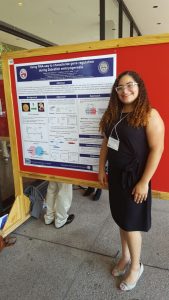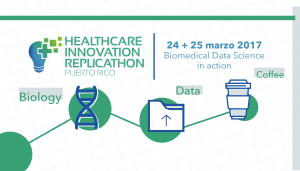Metro covered the replicathon recently.
Author: humberto
Replicathon Problem
Rafael Irizarry, IDI-BD2K partner, has submitted this problem for the Heathcare Innovation Replicathon.
In 2012, two studies (Garnett et al and Barretina et al) attempted to correlate large numbers of gene expression, mutation, and copy number measurements in hundreds of cancer cell lines with sensitivities to hundreds of different drugs, with the goal of finding genes or mutations that might indicate certain kinds of cancers with vulnerabilities to specific drugs. However, a subsequent study (Haibe-Kains et al 2013), attempting to replicate the initial findings, found major inconsistencies in the results of the two studies. We can review the papers, download the data and analyze it ourselves to form our own conclusions.
Readings for project:
- Haibe-Kains, B. et al. Inconsistency in large pharmacogenomic
studies. Nature 504, 389–393 (2013).- Barretina, J. et al. The Cancer Cell Line Encyclopedia enables predictive modelling of anticancer drug sensitivity. Nature 483, 603–607 (2012).
- Garnett, M. J. et al. Systematic identification of genomic markers of drug sensitivity in cancer cells. Nature 483, 570–575 (2012).
- Safikhani, Z. et al. Assessment of pharmacogenomic agreement. bioRxiv 48470 (2016). doi:10.1101/048470
- Smirnov, P. et al. PharmacoGx: an R package for analysis of large pharmacogenomic datasets. Bioinformatics 32, 1244–1246 (2016).
Replicathon registration open
The registration for the Varmed Management Group and IDI-BD2K Healthcare Innovation Replicathon is open. Join us March 24-25, 2017 for this event. Mentors from the University of Puerto Rico, Harvard, University of California Davis, Massachusetts Institute of Technology and more will guide groups of students to examine the issues of replicability in a set of experiments asking the same question and obtaining different answers.
Register: http://bit.ly/replicathon2017
¡Nuestros estudiantes en internados de verano 2016!
Mi nombre es Tatiana P. Ortiz Serrano y actualmente curso mi cuarto año de estudios subgraduados en la Facultad de Ciencias Naturales de la UPR-RP. El verano pasado tuve la oportunidad de completar un internado en la Universidad de Pittsburgh. Puede parecer inusual, pero la realidad es que fui parte de dos programas simultáneamente: Internship in Biomedical Research, Informatics, and Computer Science (iBRIC) y Training and Experimentation in Computational Biology (TECBio). Durante 10 semanas trabajé con el Dr. Miller T. Lee en su investigación sobre la embriogénesis en los peces cebra.
Esta representó mi primera experiencia de investigación, por lo que no faltaron las dificultades y tropiezos en el proceso. No obstante, la misma fue sumamente enriquecedora tanto en el ámbito académico como profesional. Puedo decir que amplié mis conocimientos en la disciplina que estudio, que es la Biología, y en el área de la Bioinformática. Incluso, tuve la oportunidad de presentar mi afiche en un simposio en la Universidad de Duquesne. Además, comprobé, de primera mano, la importancia del manejo de los grandes conjuntos de datos que produce la investigación científica diariamente y el rol tan importante que juega la colaboración interdisciplinaria en ello. Por otro lado, establecí lazos interpersonales, que todavía se mantienen, con compatriotas y estudiantes de otras universidades. Conocí buenos mentores quienes me ofrecieron su apoyo y consejería, y con los cuales sé que puedo contar.

Quiero instar a otros estudiantes de ciencias a participar de experiencias de internados como estos porque considero que son oportunidades excelentes para adquirir y aplicar herramientas necesarias para llevar a cabo proyectos de investigación exitosos. Como científicos debemos saber que una parte esencial del proceso de investigación es la interpretación de los resultados que se obtienen. Internados como iBRIC y TECBio brindan la plataforma para aprender más sobre cómo hacerlo y poder aplicarlo a futuros proyectos.
Summer 2017 Internships
The IDI-BD2K program seeks bright, motivated students for internships at our partner institutions next summer. Please apply now for Summer 2017 internships at Harvard, Pittsburgh, and UC Santa Cruz.
The deadline is Sunday, Feburary 19, 2017.
Bici Jangueo en El Caño Martin Peña
Nuestro Programa Interdisciplinario IDI-BD2K que promueve Biomedical Big Data, los invita a su actividad de Bici Jangueo por El Caño Martín Peña.
El propósito es crear una comunidad interdisciplinaria estudiantil interesada en solucionar problemas sociales usando la tecnología.
Cuando: Sábado, 25 febrero de 2017
Hora: 8:30 am – 12:00 pm (Nos vamos a encontrar en la Estación del Tren Urban Sagrado Corazón a las 8:30 am)
Costo: $10 incluye bicicleta y casco
Video: http://bit.ly/biciCano2017
¿Te interesa?
Registrate: http://bit.ly/biciJangueo2017
Internship opportunities at Pittsburgh
Dr. David Boone, from the University of Pittsburgh School of Medicine Department of Biomedical Informatics will be in the UPR this Friday, January 27, 2017 to speak with IDI-BD2K students on summer research opportunities at the University of Pittsburgh like iBRIC: Internship in Biomedical Research, Informatics, and Computer Science.
The presentation will be Friday, January 27, 2017 at 11:00 AM in NCL-C356.
SEMINAR: “An Introduction to Causal Modeling and Discovery Using Graphical Models”
The IDI-BD2K program is proud to announce our first seminar this year:
An Introduction to Causal Modeling and Discovery Using Graphical Models
Room NCN-A211
January 17, 2017
8:30–10:30AM
Speaker:
Dr. Greg Cooper
University of Pittsburgh
Big Data to Knowledge Center for Causal Discovery
This seminar is a general introduction for undergraduate students, graduate students and faculty interested in data analysis problems. It focuses on methods to detect possible causes of disease by analyzing large data banks.
The seminar is open to all those interested.
Save the date: Replicathon and Data Carpentry Instructor Training
The IDI-BD2K project will sponsor a replicathon and a Data Carpentry Instructor Training workshop March 24-25, 2017.
Stay tuned for more information.
Biomedical Engineering Summer Internship (BESIP)
The NIBIB sponsored Biomedical Engineering Summer Internship (BESIP) is for undergraduate biomedical engineering students who have completed their junior year of college. The 10-week program, under the guidance of Dr. Robert Lutz, BESIP Program Director, is scheduled from June 5, 2017 to August 11, 2017. The internship will allow rising senior bioengineering students to participate in cutting-edge biomedical research projects under the mentorship of world-class scientists in NIH laboratories in Bethesda, MD.
More information:
